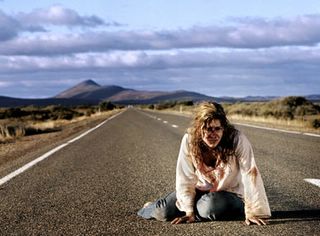For children of the 80's like myself, it's perhaps the single most iconic cultural cautionary tale. Don't behave in a cavalier, horny or dopey fashion while on a road trip, or you'll be eviscerated by homicidal rednecks or some such thing. Tobe Hooper's Texas Chainsaw Massacre, the granddaddy of the genre, remains the king of the Road Trip Gone Horribly Awry genre, but new entires continue to delight based largely on the creativity of the gore the physical attributes of the young stars.
Wolf Creek brings just enough innovation to the table to succeed, and not a bit more. The story of three unfortunate hikers who find themselves the subjects of all manner of brutality during an ill-fated trip into the Australian Outback brings exactly two original elements to the genre: a killer who dresses and sounds like Steve Irwin, the Crocodile Hunter, and the remote and menacing Outback setting.

If there have been previous Australian films to use the Outback as a horror film setting, I have not seen them. It's such a good idea, I'm kind of amazed no one has thought of it before. Desolate fields that stretch endlessly into the horizon, complete isolation save for toothless "bushman" locals and the occasional emu and mysterious "ghost towns" dotting the landscape add up to the ideal environment for the ritualistic kindapping and torture of good-looking youngsters.
Peter Weir observes in films like Picnic at Hanging Rock how the rugged Australian landscape makes a poor fit for the dress and customs brought over from Europe, and with Wolf Creek, writer/director Greg McLean expands on this idea: The Outback is a poor fit for any civilized person, European or otherwise. And considering that his harrowing film is based on a real series of murders in Australia in the late 1990's, perhaps he's right.
Liz, Kristy and Ben venture into the enormous expanse that fills the center of their continent in the course of a road trip to Sidney. (The trip will take three weeks). Along the way, they goof around, drink heavily, occasionally sleep with one another and stop to take in day-hikes at various National Parks.
Brits Liz (Cassandra Magrath) and Kristy (Kestie Morassi) exhibit exactly the kind of free-spirited, open behavior that gets you into trouble in these kinds of movies. When their companion, Oz native Ben Mitchell (Nathan Phillips), suggests a 3-hour hike to Wolf Creek Crater, it's pretty obvious to anyone save the three characters what's coming around the bend. I suppose in some ways the inevitability of the narrative in these movies is part of the joy. We know, as we get to know Liz and Kristy's personalities, that they will soon be brutalized before us, but that at least one of them will most likely survive, giving us a kind of power trip over everyone in the film.
But still, I think Wolf Creek takes a bit too long to get to the hack-and-slash stuff. Clocking in at a full hour, the goofy road trip comedy segment gets a bit grating as it goes on. After about 20 minutes, we have about as much insight as we're ever going to get. Much of the film's mid-section feels like an excuse to shoot the admittedly impressive Wolf Creek Crater. Not to mention that the film's most interesting character, professional hunter and all-around kook Mick Taylor, only winds up with about 35 minutes of screen time as a result.
As Taylor, John Jarratt really plays up the silliness. His ridiculous chortle becomes a kind of trademark by the film's end, along with his brutally frank, cold-blooded sense of humor. It sounds terrible, but in the context of the film, it really works, if only for the entertainment value of seeing a Down Under stereotype turned on its ear. Jarratt doesn't go for camp, but something approaching satire. He gets away with his nefarious crimes because people trust him - what tourist doesn't want to take an adventure with Crocodile Dundee? (Look out for a classic Paul Hogan catch-phrase to make a late appearance).
The deaths themselves don't really compare with the outrageous gore-for-gore's-sake of a film like Hostel, a movie that's superior in just about every way. But they're suitably disgusting to please the standard horror fan, particularly a crucifixion, a mode of killing that's making a big comeback in horror movies of late. Thanks for that one, Mr. Gibson!

just a comment on the outback landscape as a character in horror films, theres a few , razorback, picnic @ hanging rock, cry in the night based on the lindy chaimberlain story,wake in fright, kind of interesting that the land plays a role like a character.
ReplyDeleteIs "Cry in the Night" the one where the dingo eats Meryl Streep's baby? I've seen that one. I love "Picnic at Hanging Rock," which is a really great example of a director making the most out of the desolation and otherworldliness of the Outback.
ReplyDeleteHaven't even heard of "Razorback" or "Wake in Fright." Have to see if those are on DVD here in the U.S.